BMW iX1 VS Mercedes Vito Bus
BMW iX1
The BMW iX1 stands out as a versatile addition to the electric vehicle market, seamlessly combining compact dimensions with advanced electric technology. Its sophisticated design elements and premium interiors ensure a luxurious driving experience, while the vehicle's performance focuses on delivering both efficiency and agility. With enhanced connectivity features and an emphasis on sustainability, this model represents a significant step forward in BMW's commitment to a greener future.
more informationMercedes Vito Bus
The Mercedes-Benz Vito Bus offers a versatile solution for those in need of spacious and comfortable group transportation. Its refined interior is designed to enhance passenger comfort, making it ideal for both business and leisure travel. With a focus on safety and efficiency, it provides a reliable driving experience that aligns with the high standards expected of the Mercedes-Benz brand.
more information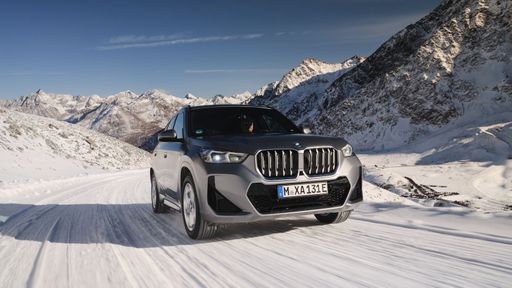 @ press.bmwgroup.com
@ press.bmwgroup.com
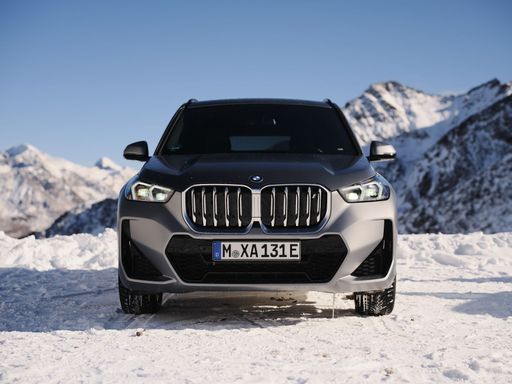 @ press.bmwgroup.com
@ press.bmwgroup.com
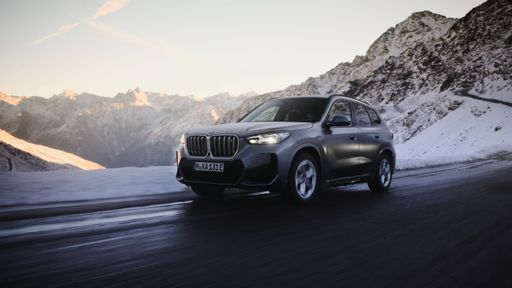 @ press.bmwgroup.com
@ press.bmwgroup.com
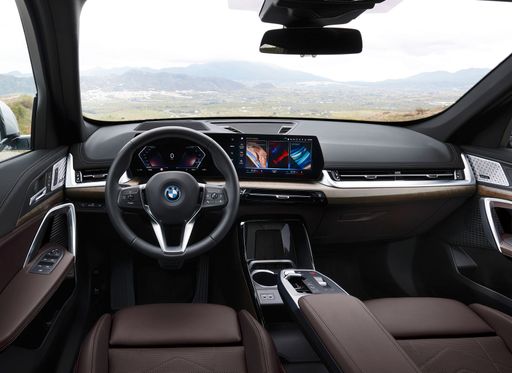 @ press.bmwgroup.com
@ press.bmwgroup.com
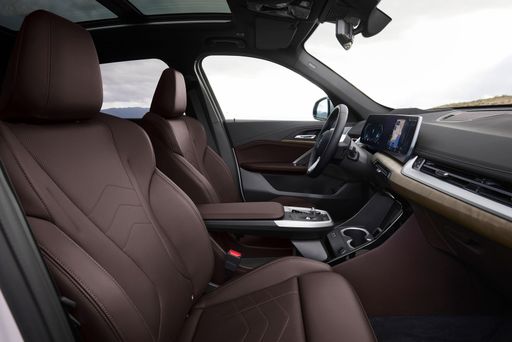 @ press.bmwgroup.com
@ press.bmwgroup.com
Costs and Consumption |
|
|---|---|
|
Price
about 44700 - 58400
$
|
Price
about 42400 - 63600
$
|
|
Consumption L/100km
-
|
Consumption L/100km
6.7 - 7.8
L
|
|
Consumption kWh/100km
15.8 - 17.1
kWh
|
Consumption kWh/100km
26.7 - 26.9
kWh
|
|
Electric Range
436 - 463
km
|
Electric Range
248 - 371
km
|
|
Battery Capacity
64.8
kWh
|
Battery Capacity
60 - 90
kWh
|
|
co2
0
g/km
|
co2
180, 198, 186, 202, 190, 177, 196, 183, 200, 187, 178, 184, 188, 189, 0, 204, 191, 206, 192
g/km
|
|
Fuel tank capacity
-
|
Fuel tank capacity
57 - 70
L
|
Dimensions and Body |
|
|
Body Type
SUV
|
Body Type
Bus
|
|
Seats
5
|
Seats
8
|
|
Doors
5
|
Doors
4
|
|
Curb weight
1940 - 2085
kg
|
Curb weight
2483 - 2630
kg
|
|
Trunk capacity
490
L
|
Trunk capacity
580 - 1390
L
|
|
Length
4500
mm
|
Length
4895 - 5370
mm
|
|
Width
1845
mm
|
Width
1928
mm
|
|
Height
1616
mm
|
Height
1890
mm
|
|
Payload
495
kg
|
Payload
870 - 1017
kg
|
Engine and Performance |
|
|
Engine Type
Electric
|
Engine Type
Diesel, Electric
|
|
Transmission
Automatic
|
Transmission
Manuel, Automatic
|
|
Transmission Detail
Reduction Gearbox
|
Transmission Detail
Manual Gearbox, Automatic Gearbox, Reduction Gearbox
|
|
Drive Type
Front-Wheel Drive, All-Wheel Drive
|
Drive Type
Rear-Wheel Drive, All-Wheel Drive, Front-Wheel Drive
|
|
Power HP
204 - 313
HP
|
Power HP
136 - 237
HP
|
|
Acceleration 0-100km/h
5.6 - 8.6
s
|
Acceleration 0-100km/h
-
|
|
Max Speed
170 - 180
km/h
|
Max Speed
140
km/h
|
|
Torque
250 - 494
Nm
|
Torque
330 - 500
Nm
|
|
Number of Cylinders
-
|
Number of Cylinders
4
|
|
Power kW
150 - 230
kW
|
Power kW
100 - 174
kW
|
|
Engine capacity
-
|
Engine capacity
1950
cm3
|
|
Top speed
170 - 180
km/h
|
Top speed
140
km/h
|
General |
|
|
Model Year
2022 - 2023
|
Model Year
2024
|
|
CO2 Efficiency Class
A
|
CO2 Efficiency Class
G, A
|
|
Brand
BMW
|
Brand
Mercedes-Benz
|
BMW iX1
A New Era of Innovation: Meet the BMW iX1
The automotive world has seen a seismic shift towards sustainability and electrification, and BMW has solidified its place in this evolution with the introduction of the BMW iX1. As a fully electric SUV, the iX1 serves as a testament to how luxury, performance, and eco-consciousness can harmoniously blend in the modern automotive landscape.
Exquisite Design Meets Purposeful Engineering
The BMW iX1 is not just an electric vehicle; it's an embodiment of cutting-edge design and technology. With its bold SUV silhouette, the iX1 boasts dimensions of 4500 mm in length, 1845 mm in width, and 1616 mm in height, providing a spacious yet agile presence on the road. Its dynamic aesthetic is complemented by an aerodynamic form that enhances efficiency, offering a drag coefficient that rivals traditional SUV models.
Powertrain and Performance Specifications
Beneath the hood of the BMW iX1 lays an electric motor that signifies the future of automotive engineering. Available variants offer power outputs ranging from 204 to 313 PS (150 to 230 kW). The iX1 comes with either a front-wheel or all-wheel drivetrain, catering to different driving preferences. The xDrive30 variant, in particular, features all-wheel drive, delivering up to 313 PS for those who crave enhanced traction and control.
With a commendable electric consumption of 15.8 to 17.1 kWh per 100 km, the iX1 strikes a fine balance between power and efficiency. Its acceleration stats are equally impressive, with the ability to go from 0-100 km/h in as little as 5.6 seconds. This ensures that while it's eco-friendly, it does not compromise on the exhilaration factor. The vehicle can reach a top speed range between 170 and 180 km/h.
A Journey Without Interruptions: Range and Battery Life
The iX1's battery, boasting a capacity of 64.8 kWh, provides a substantial driving range of 436 to 463 km on a single charge, depending on the variant. This means long road trips are not only feasible but enjoyable, eliminating the range anxiety often associated with electric vehicles.
Comfort and Technological Interior
Inside, the iX1 exemplifies BMW’s commitment to luxury and innovation. It’s a five-seater SUV designed with comfort at its forefront, featuring advanced technological interfaces that enrich the driving experience. The spacious cabin offers 490 litres of boot space, ensuring practicality without sacrificing style.
In terms of monthly costs, owning an iX1 can range between €1,147 and €1,453, considering the zero-emission appeal with a CO2 efficiency class of A.
The Financial Aspect of Sustainability
With a price range from €48,400 to €63,140, the BMW iX1 isn't just a vehicle—it's an investment in sustainable motoring. Factoring in a cost of around 45.9 to 58.1 cents per kilometre, the iX1 offers an economically viable option for the eco-conscious driver.
Conclusion: The Future Is Now
The BMW iX1 stands as a beacon of what the future holds for zero-emission vehicles. With a melding of sustainability, performance, and luxury, it's not just a car, but a glimpse into the next chapter of automotive history.
Mercedes Vito Bus
The Mercedes Vito Bus: A Comprehensive Look at Innovation and Performance
In the automotive world, the Mercedes Vito Bus stands out as a versatile and reliable choice for those in need of a spacious and efficient mode of transport. With a reputation for engineering excellence, Mercedes-Benz has once again delivered with the latest versions of the Vito Bus. This article delves into the technical aspects, innovations, and what makes the Vito Bus a prime option in its segment.
Engine Power and Efficiency
The Mercedes Vito Bus offers a remarkable range of engine configurations, catering to both diesel and electric powertrains. The diesel models come with options ranging from 136 HP to a powerful 237 HP. The robust four-cylinder diesel engines are designed for efficiency, offering a range of fuel consumption figures from 6.7 L to 7.8 L per 100 kilometers, depending on the variant. Meanwhile, the electric eVito Tourer provides an impressive alternative with a power output of 204 HP and offers ranges of up to 371 kilometers on a single charge, making it a frontrunner in sustainable transportation solutions.
Transmission and Drivetrain Options
The Vito Bus is equipped with both manual and automatic transmission options, ensuring a drive tailored to user preferences. The 9G-TRONIC automatic gearbox is notable for its smooth transitions, enhancing the driving experience. Customers can choose between rear-wheel drive and the adaptable all-wheel drive system. The introduction of the eVito Tourer's front-wheel drive system further expands the versatility of the lineup, offering an electric alternative for urban and rural environments alike.
Interior Comfort and Practicality
The interior of the Vito Bus is designed with comfort and convenience in mind. Capable of seating up to eight passengers, the spacious cabin is ideal for family travel or business transportation. The Vito Bus offers three body lengths—kompakt, lang, and extralang—providing flexibility to accommodate different passenger and cargo requirements. The well-thought-out design ensures ample storage with trunk capacities ranging up to 1,390 liters in certain configurations.
Advanced Innovations
Mercedes-Benz has equipped the Vito Bus with a host of advanced technological features. The focus on safety is evident, with systems like Crosswind Assist and Attention Assist, ensuring greater control and alertness on the road. The eVito Tourer comes with the latest in electric vehicle technology, including efficient battery management systems that optimize range and performance.
Performance and Dynamics
The Vito Bus showcases impressive performance metrics across its variants. With a maximum torque ranging from 330 Nm to 500 Nm, the Vito Bus ensures a responsive and agile driving experience. The consistent build quality and dynamic chassis contribute to a pleasing ride, whether navigating city streets or cruising on the highway.
Conclusion
The Mercedes Vito Bus continues to be a leading choice for those looking for a reliable and performance-oriented vehicle. With its diverse range of engine options, innovative features, and versatile configurations, the Vito Bus meets the demands of both personal and professional transportation. The introduction of electric variants highlights Mercedes-Benz's commitment to sustainability without compromising on power or range. As the automotive industry continues to evolve, the Vito Bus exemplifies the blend of traditional excellence and forward-thinking innovation.
